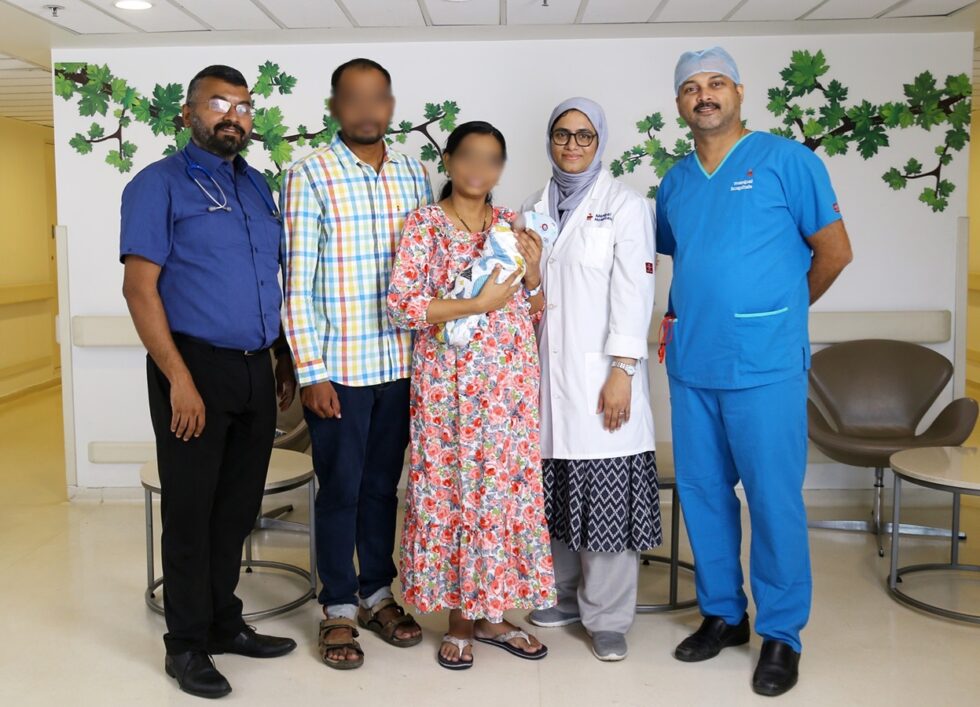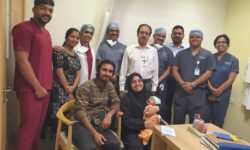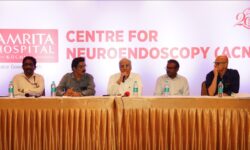
KANNUR:
High-risk pregnancies due to Rh factor alloimmunization pose significant challenges for expectant mothers and their babies. In a recent case at KMC Hospital, a collaborative effort among specialists led to a successful outcome for a mother facing Rh incompatibility complications during her third pregnancy.
Rh incompatibility occurs when the mother has a negative Rh blood group, and the father has a positive Rh blood group. Dr. Sameena H, Consultant OBG, KMC Hospital Mangalore, explains, “Subsequent pregnancies might get complicated due to Rh factor alloimmunization, where the mother’s immune system produces antibodies against the fetus’s Rh-positive blood.”
Ramya (name changed), a mother-to-be, faced daunting circumstances during her third pregnancy. Her previous pregnancy ended tragically with her baby diagnosed with intracerebral hemorrhage, leading to complications and eventual loss. Anticipating further challenges, Ramya sought intensive monitoring at KMC Hospital.
Dr. Sameena and her team closely monitored Ramya’s pregnancy, conducting repeated blood investigations. Until the 30th week the results remained negative. However, at the 32nd week, her ICT (indirect Coombs test) returned positive with high titers, indicating fetal anemia. Dr. Sameena emphasizes, “Fetal anemia posed a significant risk, necessitating careful planning.”
Dr. Pundalik Baliga, Consultant Fetal Medicine, KMC Hospital Mangalore, highlights the significance of intrauterine transfusion (IUT), stating, “IUT is a specialized procedure to manage severe fetal anemia. In Ramya’s case, with fetal haemoglobin levels plummeting, timely intervention was imperative to safeguard the baby’s well-being.”
Coordinating swiftly, KMC Hospital’s Department of Blood Transfusion and Immunohematology arranged O Negative irradiated and leucocyte-depleted packed red blood cells for the procedure. Intrauterine transfusion was performed meticulously by Dr Baliga and Team, ensuring both precision and safety.
To overcome the risks associated with premature delivery, prolonging the pregnancy until the 35th week was crucial for the baby’s well-being. Dr. Mario J. Bukelo, Consultant Neonatologist & Paediatrician, KMC Hospital Mangalore, recounts, “After birth, the baby was very anaemic, with a haemoglobin level much lower than normal newborns. Two exchange transfusions were performed to improve the baby’s haemoglobin and bilirubin levels, allowing for a healthy recovery.”
The successful outcome of Ramya’s pregnancy demonstrates the power of collaboration and advanced medical interventions in overcoming the challenges of Rh factor alloimmunization. Through dedicated care and expertise, Ramya and her baby emerged victorious, inspiring hope for expectant mothers facing similar circumstances.
Saghir Siddiqui, Regional Chief Operating Officer, KMC Hospital, Mangalore, underscores the importance of multi-specialty support in managing high-risk pregnancies. “Each doctor plays a vital role in ensuring a safe delivery and managing complications. Collaboration among specialists ensures proper planning, timely interventions, and reassurance throughout the pregnancy journey,” says Siddiqui.




